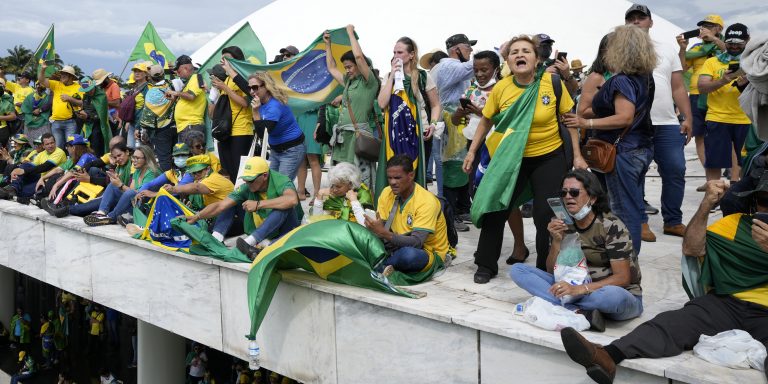INTELBRIEF
January 30, 2023
IntelBrief: How Far Will Brazil Go to Prosecute Capitol Attacks?

Bottom Line Up Front
- Despite high-level characterizations of Brazil’s capitol rioters as “terrorists,” initial indictments so far do not include terrorism charges.
- Brazil’s terrorism law does not encompass politically motivated activities.
- The government may still seek to apply terrorism charges as it expands its investigation into organizers, financiers, and other potential conspirators.
- Despite similarities between recent right-wing attacks on Brazilian and U.S. capitols, Brazil’s authorities have shown a greater appetite for swift and harsh responses.
When the first indictments were laid out against Brazil’s capital rioters earlier this month, charges ranged from destruction of public property to coup activities. Notably absent, however, were terrorism charges. This omission may have come as a surprise for those attuned to how the country’s leadership described the attacks in Brasilia. A joint statement — issued by Brazilian President Inácio Lula da Silva, Congressional leaders, and the chief justice of the Supreme Court — condemned what they described as “terrorist acts," while justice minister Flávio Dino also described the riot as terrorism, echoing rhetoric he had used in previous weeks while discussing a foiled bomb plot. Likewise, the head of Brazil’s federal police says that officials who intentionally undermined capitol security ahead of the riot “contributed to terrorist acts.”
Brazilian law does not include politically motivated activities in its criminal definition of terrorism. Instead, its terrorism statute focuses on actions carried out “for reasons of xenophobia, discrimination, or prejudice based on race, color, ethnicity or religion.” While there may be many more indictments to come for the thousands of alleged rioters, given this context, it is not clear if or how the state will pursue prosecutions on the grounds of terrorism. Nonetheless, press reports suggest authorities may be trying to build at least one such case, as the federal investigation expands beyond the foot soldiers and sets its sights on organizers, financiers, and government conspirators. After the attempted bombing of Brasilia’s airport, Dino proposed creating “special groups to combat terrorism and irresponsible weaponry.”
Anderson Torres, a former security chief for the district that encompasses Brasilia, is accused of authoring a draft decree to overturn the country’s recent presidential election, which was unearthed during a federal raid on his home. Torres and another security official, both of whom have been fired and arrested, are said to be under investigation for terrorism as well as offenses related to the overthrow of democracy. Meanwhile, President Lula has openly accused his predecessor, Jair Bolsonaro, of fomenting the violence at the capitol, and has accused some members of law enforcement and the military of “colluding” with the rioters. Bolsonaro is also a subject of the probe into the attacks.
While commentators often compare Brazil’s riots to the January 6 attack on the U.S. Capitol, the speed and intensity of the Brazilian response demonstrate a marked divide with that of the U.S. government. Brazilian authorities made about 300 arrests on the day of the riot and detained 1,200 others the following day at a camp where pro-Bolsonaro protestors had been calling for the military to oust President Lula. Within four days of the attacks, Brazilian authorities had made nearly 1,200 formal arrests, most of which now await formal charges.
By comparison, only 20 arrests were made inside the U.S. Capitol or by Capitol Police on January 6, 2021, while about 40 others (largely curfew violations) occurred around the city that day. More than half of the 950 plus arrests made since January 6 occurred in the first six months of the investigation. Punishments have also been relatively light for the typical American capitol rioter: most have received no jail time, and those who did have been sentenced to an average of 48 days in prison. While more serious charges have been pressed for crimes like assaulting a police officer or attempting to obstruct official government proceedings, the prosecution’s holy grail — sedition charges — has been applied sparingly. Though U.S. prosecutors have said they believe that January 6 qualified as an act of domestic terrorism, they have generally not attempted to qualify defendants’ actions as terrorism in court, nor sought out the sentencing enhancements that could be applied under such a categorization.
Despite calls for a standalone federal domestic terrorism statute in the wake of January 6, and U.S. President Joseph Biden, like Lula, referred to those who attacked the capitol as “terrorists,” domestic terrorism is not a federal crime in and of itself in the United States. Likewise, given the hurdles of Brazil’s current legal definitions, it is not clear how terrorism charges can be faithfully executed in the case of its own capitol attacks. However, the Brazilian Supreme Court — particularly Chief Justice Alexandre de Moraes — has earned a reputation for pushing against — some would argue past — the limits of its mandates to counter right-wing extremism. In 2019, Moraes granted his court the power to initiate its own investigations rather than having to wait for law enforcement to take the lead. Prior to the attacks in Brasilia, the court has demanded that social media companies take down content and accounts with little transparency, and sometimes without explanation whatsoever. The court has jailed people without trial for making threats on social media and removed the accounts of several members of Congress. Apart from his actions against the anti-democratic right, Moraes also ordered the retraction of an article linking him to corruption, which he later rescinded when the publisher produced evidence of the report.
In addition to the investigations into Bolsonaro and former security officials, Moraes has ordered that Brasilia’s former governor be suspended for 90 days over his alleged complacency towards the capital attacks. As for how this broad interpretation of the court’s constitutional constraints will influence the country’s pursuit of justice against these new threats to its democracy, only time will tell.